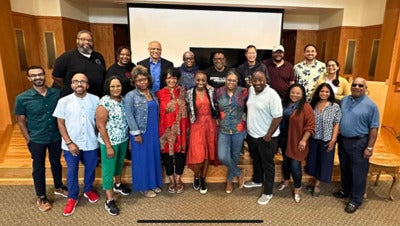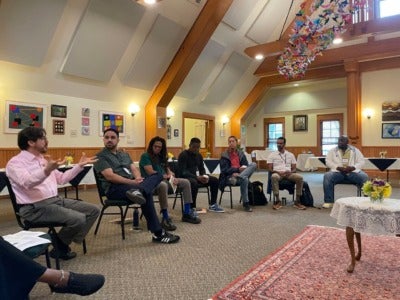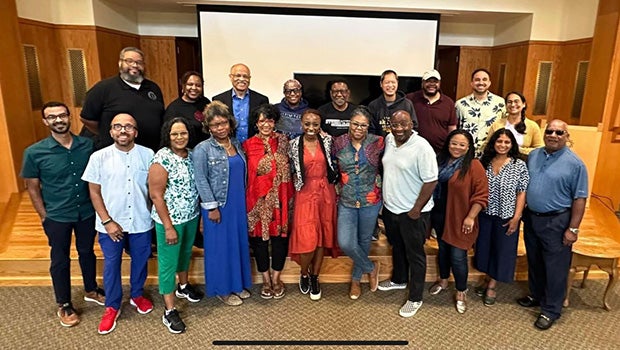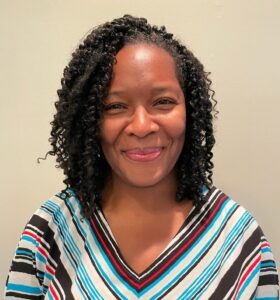The Aspen Institute Religion and Society Program’s Racial Justice and Religion Collective members gathered at the Green Acre Bahá’i School of Learning in Eliot, ME from Sept. 9-13.“The retreat was a generative space to connect with people doing the work of justice from various faith traditions,” Racial Justice & Religion Collective Special Advisor Ekemini Uwan said. “We had a fruitful time of connection, and I look forward to the journey of learning and building a just world together.” The RJR Collective includes accomplished and experienced activists, faith leaders, organizers, scholars, and racial justice practitioners passionate about exploring religious pluralism and multi-faith coalition building in the United States’ struggle for racial justice. Deep reflections about the challenges and oppression that marginalized communities face sparked meaningful dialogue about confronting those challenges and naming the oppression. Green Acre provided the perfect immersive learning environment.“Even though I was one of the few Asian Americans at the retreat,” San Francisco State University Professor Russell Leung said, “I felt a great sense of inclusion and belonging and now look forward to working more closely with everyone.”Rev. Dr. Velda Love, United Church of Christ minister for Racial Justice, helped collective members create and deepen bonds with transformative sessions focused on humans’ collective history and our personal histories. Love also reminded Collective members that their bodies are temples and rest is a spiritual practice.Composing and reciting individual I Am poems helped collective members get clear about who they are and introduced them to each other. Sharing helped create deeper bonds.Meanwhile, P.J. Andrews and Selvi Adaikkalam Zabbihi of the U.S. Bahá’i Office of Public Affairs walked attendees through a discussion about constructing an honest, inclusive, and forward-looking narrative of America. Reviewing an interfaith coalition-produced document sparked a powerful discussion.Delving into a document drafted by a coalition, including the U.S Bahá’i Office of Public Affairs, sowed the seeds that yield fruitful conversation about the document’s conclusions. A concern about its naivete was raised. It invited acknowledging how the American narrative has been grounded in western Christian theology.With that said, Collective members still found time for fun amid the deep conversations and confronting our nation’s challenges. Games brought out the communal and competitive side of some collective members. Laughter dominated those moments. The stress of fighting for freedom calls for some frivolity in the face of struggle.
The RJR Collective includes accomplished and experienced activists, faith leaders, organizers, scholars, and racial justice practitioners passionate about exploring religious pluralism and multi-faith coalition building in the United States’ struggle for racial justice. Deep reflections about the challenges and oppression that marginalized communities face sparked meaningful dialogue about confronting those challenges and naming the oppression. Green Acre provided the perfect immersive learning environment.“Even though I was one of the few Asian Americans at the retreat,” San Francisco State University Professor Russell Leung said, “I felt a great sense of inclusion and belonging and now look forward to working more closely with everyone.”Rev. Dr. Velda Love, United Church of Christ minister for Racial Justice, helped collective members create and deepen bonds with transformative sessions focused on humans’ collective history and our personal histories. Love also reminded Collective members that their bodies are temples and rest is a spiritual practice.Composing and reciting individual I Am poems helped collective members get clear about who they are and introduced them to each other. Sharing helped create deeper bonds.Meanwhile, P.J. Andrews and Selvi Adaikkalam Zabbihi of the U.S. Bahá’i Office of Public Affairs walked attendees through a discussion about constructing an honest, inclusive, and forward-looking narrative of America. Reviewing an interfaith coalition-produced document sparked a powerful discussion.Delving into a document drafted by a coalition, including the U.S Bahá’i Office of Public Affairs, sowed the seeds that yield fruitful conversation about the document’s conclusions. A concern about its naivete was raised. It invited acknowledging how the American narrative has been grounded in western Christian theology.With that said, Collective members still found time for fun amid the deep conversations and confronting our nation’s challenges. Games brought out the communal and competitive side of some collective members. Laughter dominated those moments. The stress of fighting for freedom calls for some frivolity in the face of struggle. Nina Fernando, Shoulder To Shoulder Campaign Executive Director, reflected on what she gained from the gathering.“Our retreat offered space to explore our personal narratives and our shared communal narratives that connect us to our best selves and to one another, to the stories of our ancestors, and to the even greater story of our shared humanity,” Fernando said. “We took part in big picture discussions on how we might go about “constructing an honest, inclusive, and forward-looking narrative in America.” The time together, punctuated by Rev. Dr. Love’s great sessions, emphasized the importance of rest in the midst of struggle for justice and peace. That wasn’t lost on Kia Smith, Faith Advocate & Faith Life in Public Senior Director of Communications.“It’s easy for faith leaders to be consumed by the tolling work of faith and justice, especially when our systems and structures are failing us and it feels like the entire world is on fire. As holy and vital as our work is, we can’t be so entrenched in it that we fail to take care of ourselves,” Smith said. “[The retreat] was an important reminder of how important play and rest are in the work of social justice. Play and rest provide an avenue for us to become reacquainted with our bodies, souls and spirits; it revitalizes us and empowers us to continue the divine work ahead of us.”Collective members next convene during a pilgrimage to Birmingham and Montgomery, Ala. from Oct. 1-5. The Religion & Society Program has contracted Freedom Road to lead the Montgomery part of the pilgrimage on Oct 2-3. On Oct 4, the Collective will be hosted by RSP partners, Community Foundation of Greater Birmingham, for pilgrimage in Birmingham, AL that includes a visit to Sixteenth Street Baptist Church and Birmingham Civil Rights Institute. The Alabama pilgrimage will take Collective members on an important and impactful journey.What began as the Inclusive America Project in 2012 transformed into the Religion and Society Program at the Aspen Institute in 2022. Its mission remains to deepen the understanding of how religion advances equity and the common good. Bridging the gap between ideas and impact is the program’s central focus. Maintaining that focus helps build faith leaders’ capacity, increase philanthropic support, and create a beloved community of diverse faith leaders.The Program focuses on bridging the gap between ideas and impact, working to build the capacity of faith-based leaders, increase philanthropic investment, and serve as a national knowledge hub that informs and connects leaders from various.Here’s a complete list of the Collective.
Nina Fernando, Shoulder To Shoulder Campaign Executive Director, reflected on what she gained from the gathering.“Our retreat offered space to explore our personal narratives and our shared communal narratives that connect us to our best selves and to one another, to the stories of our ancestors, and to the even greater story of our shared humanity,” Fernando said. “We took part in big picture discussions on how we might go about “constructing an honest, inclusive, and forward-looking narrative in America.” The time together, punctuated by Rev. Dr. Love’s great sessions, emphasized the importance of rest in the midst of struggle for justice and peace. That wasn’t lost on Kia Smith, Faith Advocate & Faith Life in Public Senior Director of Communications.“It’s easy for faith leaders to be consumed by the tolling work of faith and justice, especially when our systems and structures are failing us and it feels like the entire world is on fire. As holy and vital as our work is, we can’t be so entrenched in it that we fail to take care of ourselves,” Smith said. “[The retreat] was an important reminder of how important play and rest are in the work of social justice. Play and rest provide an avenue for us to become reacquainted with our bodies, souls and spirits; it revitalizes us and empowers us to continue the divine work ahead of us.”Collective members next convene during a pilgrimage to Birmingham and Montgomery, Ala. from Oct. 1-5. The Religion & Society Program has contracted Freedom Road to lead the Montgomery part of the pilgrimage on Oct 2-3. On Oct 4, the Collective will be hosted by RSP partners, Community Foundation of Greater Birmingham, for pilgrimage in Birmingham, AL that includes a visit to Sixteenth Street Baptist Church and Birmingham Civil Rights Institute. The Alabama pilgrimage will take Collective members on an important and impactful journey.What began as the Inclusive America Project in 2012 transformed into the Religion and Society Program at the Aspen Institute in 2022. Its mission remains to deepen the understanding of how religion advances equity and the common good. Bridging the gap between ideas and impact is the program’s central focus. Maintaining that focus helps build faith leaders’ capacity, increase philanthropic support, and create a beloved community of diverse faith leaders.The Program focuses on bridging the gap between ideas and impact, working to build the capacity of faith-based leaders, increase philanthropic investment, and serve as a national knowledge hub that informs and connects leaders from various.Here’s a complete list of the Collective.
Racial Justice & Religion Collective Gathers For Powerful Retreat


Rev. Dr. Audrey Price
Deputy Director
